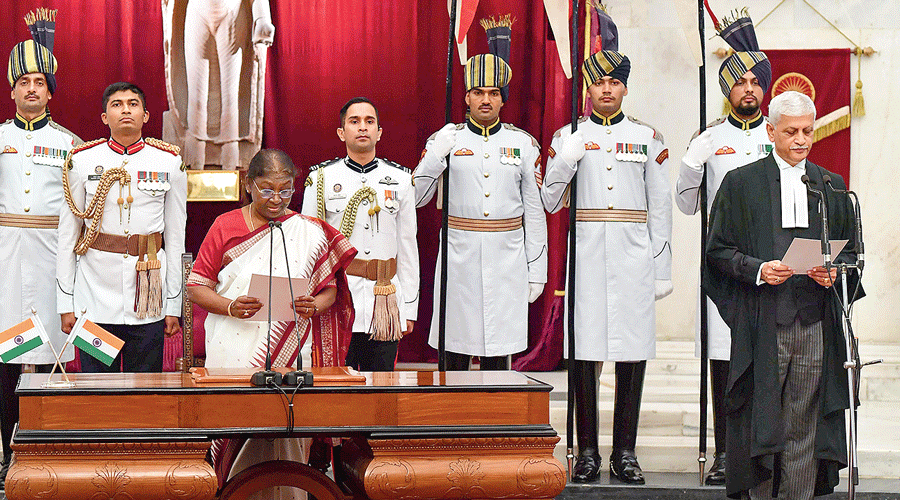Justice Uday Umesh Lalit, the senior-most judge of the Supreme Court, was on Saturday sworn in as the 49th Chief Justice of India.
President Droupadi Murmu administered the oath of office and secrecy to Justice Lalit at the Durbar Hall of Rashtrapati Bhavan.
The outgoing Chief Justice of India, Justice N.V. Ramana, Prime Minister Narendra Modi, Vice-President Jagdeep Dhankhar, former President Ram Nath Kovind, CJI-in-waiting D.Y. Chandrachud, Union law minister Kiren Rijiju, judges of the Supreme Court and high courts and other dignitaries were present on the occasion.
Justice Lalit will have a short stint of around two-and-a-half months as CJI as he is due to retire on November 8. He is to be succeeded by Justice Chandrachud.
Justice Chandrachud is to take over from Justice Lalit on November 9 and is scheduled to be CJI till November 10, 2024.
Justice Lalit, who will be in office for 74 days, said on Friday while addressing the farewell event organised in honour of Justice Ramana by the Supreme Court Bar Association that he had held wide-ranging interactions with members of the Bar to shortlist three issues he would take up.
The issues are:
⚫ Bring more transparency to the system of listing matters before the Supreme Court.
There has been criticism from the Bar that many matters that require priority listing do not get so while those that are not so urgent are prioritised by the registry.
⚫ Introduce a system under which urgent matters will be mentioned directly before the bench concerned.
Now, matters for urgent listing are orally mentioned in the court of the Chief Justice of India even if they relate to other benches, causing considerable delay in listing. Further, proceedings in the Chief Justice’s court get indefinitely delayed as the bench has to first deal with urgent mentioning matters and thereafter start hearing the cases listed before it.
⚫ Ensure that at least one constitution bench functions throughout the year.
There are currently 492 matters that require consideration by five- or seven-judge constitution benches. Justice Lalit has listed 25 constitution bench matters for hearing from August 29.
However, technically, the question of continued hearing of matters before constitution benches throughout the year may not be feasible as from November 9 it would be the next CJI’s prerogative to take a decision on the matter.
The CJI as the “master of roster” constitutes benches and allots cases.
Justice Lalit was one of the finest criminal lawyers of the country before he was elevated as a Supreme Court judge by the collegium headed by then Chief Justice of India R.M. Lodha on August 13, 2014.
Born on November 9, 1957, Justice Lalit was enrolled as an advocate in June 1983 and practised in the High Court of Bombay till December 1985 before shifting to Delhi in January 1986.
Designated as senior advocate by the Supreme Court in April 2004, Lalit had appeared as amicus curiae to assist in many matters. He was appointed special public prosecutor for the CBI to conduct trial in all 2G matters under the orders of the Supreme Court.
He had been a member of the Supreme Court of India Legal Services Committee for two terms. The committee provides legal aid to the marginalised and weaker sections of society.
Earlier this week, Justice Lalit, heading a three-judge bench, had expressed concern over the prolonged incarceration of human rights activist Teesta Setalvad.
“We are concerned with one thing. Our concern is that the person is behind bars. We have to test whether her (Setalvad’s) incarceration is needed,” Justice Lalit had told solicitor-general Tushar Mehta on August 25.
Setalvad was arrested on June 25 for allegedly fabricating evidence to frame “innocent people” in the 2002 Gujarat riots cases.
Justice Lalit is expected to take up Setalvad’s bail plea on Tuesday.











